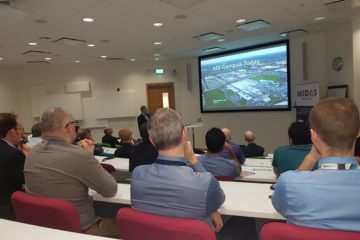New mmWave HVM Process to be developed by Arralis and Tyndall
Cork and Limerick, 19 February 2019: Leading Irish tech manufacturer, Arralis, has entered into a €400k research development agreement with Tyndall National Institute, to develop a next generation mmWave fabrication technology for use in applications such as autonomous vehicles, satellite communications, 5G and radar imaging.
Welcoming the collaboration and investment, Tyndall’s Senior Staff Scientist Dr James Rohan said, “We are delighted to work with Arralis on this exciting project which combines Tyndall’s micro-fabrication expertise in thick-film electrochemical simulation, processing, integration and testing with the design capabilities of Arralis for the rapidly developing mmWave device market.”
Supported by Enterprise Ireland through the Innovation Partnership programme, the development of new Monolithic Microwave Integrated Circuits, MMICs, is vital given the growth of data-centric traffic, increased demands on our current communications networks and future Internet of Things (IoT) application requirements including autonomous vehicles and satellite communications.
“Our data-hungry society demands constant, uninterrupted access to more and more information, and this demand will only increase in the future. New cost-effective, high-volume and geometry-scaled mmWave manufacturing is needed to meet future IoT demands. The partnership of two leaders in this area, Arralis and Tyndall, will enable us to take a step closer to global interconnectivity through new integrated mmWave technologies,” said Marie Bourke, Arralis Business Process Manager and Technical Programme Manager.
As autonomous vehicles require unimpeded data access to connected vehicles, Ka and W band wireless communications are essential. Ka band supports high data rates, device connectivity, data collection and traffic handling capacity at lower latency than current technologies, leading to the expectation that 5G will be up to 60 times faster than 4G networks.
“The combination of world-class research at Tyndall, and market leading manufacturing expertise of Arralis ensure that this will be a highly effective collaboration as well as a timely one, given the proposed testing of autonomous vehicles on Ireland’s road infrastructure in the coming years. Tomorrow’s cars will be computers on wheels and will require Ka band mmWave technology to simplify and support the communication protocol between the car and its environment. Arralis is a leader in the field of mmWave design and together with Tyndall, we will accelerate innovation in this and other areas,” said Carlo Webster, Senior Strategic Business Development Executive at Tyndall National Institute.
ENDS
For media enquiries, please contact
Renate Murphy, CAMEO Communications, tel: 086.8145462 email: renate@cameo.ie
Notes to Editor
About Arralis
Arralis is a rapidly scaling technology company, providing world leading expertise in RF, micro and millimetre-wave technology. With a head office in Limerick, Ireland, Arralis also has subsidiaries in Belfast and Manchester, UK. Arralis excels in Monolithic Microwave Integrated Circuits (MMICs), packaged component modules, proprietary antenna technology and integrated radar and communications front-end platforms. Its core focus is in E, Ka and W band where it is the world leader at the highly desirable attenuation window of 94GHz, which allows the development of very high resolution radar; applications of which include autonomous automotive, helicopter landing, satcomms and massive data rate wireless communications. Arralis products, which are the ultimate in precision and innovation, are used in both global and space environments where accuracy and reliability are critical. Arralis works with some of the world’s largest aerospace, automotive, defence and communications companies.
About Tyndall National Institute
Tyndall is a leading European research centre in integrated ICT (Information and
Communications Technology) materials, devices and systems. It is one of Ireland’s 5 National Labs, specialising in both electronics and photonics. Tyndall works with
industry and academia to transform research into products in its core market areas of electronics, communications, energy, health, agri-tech & the environment. With a network of over 200 industry partners and customers worldwide, they are focused on delivering human and economic impact from excellence in research. A research flagship of University College Cork, Tyndall employs over 500 researchers, engineers and support staff across 52 nationalities, including a cohort of 120 full time graduate students. i

